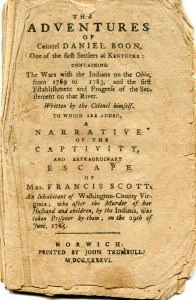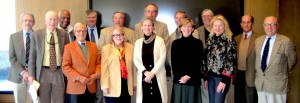On Saturday we hosted a meeting of the Acorn Club–a small but dedicated bibliophilic group (their archives are at the Connecticut Historical Society) that publishes books related to Connecticut history. Here are a few of the more than 30 publications that they have published over the last 100 years:
Thomas Short : the first printer of Connecticut, by W. De Loss Love (Hartford, 1901)
Supplementary list of books printed in Connecticut, 1709-1800, by Albert Carlos Bates, M.A. (Hartford, 1938)
The journal of William Stebbins, Stratford to Washington in 1810, with an introduction by Leonard W. Labaree and notes by Pierce W. Gaines (Hartford, 1968)
Letters and documents of Ezekiel Williams of Wethersfield, Connecticut, Deputy Commissary General of Prisoners of War within the State of Connecticut (1777-c.1783), introduction & notes by John C. Parsons (Hartford, 1976)
John Warner Barber’s views of Connecticut towns 1834-36, edited by Christopher P. Bickford, J. Bard McNulty (Hartford, 1990)
Connecticut observed : three centuries of visitors’ impressions, 1676-1940, edited by Richard Buel, Jr. and J. Bard McNulty (Hartford, 1999)
 For the members’ enjoyment I brought out a random sampling of items from our collection of books printed in Connecticut prior to 1800. The earliest was this funeral sermon printed in New London and written by Cotton Mather, on Gurdon Saltonsall (1666-1724), Governor of Connecticut from 1708-1724.
For the members’ enjoyment I brought out a random sampling of items from our collection of books printed in Connecticut prior to 1800. The earliest was this funeral sermon printed in New London and written by Cotton Mather, on Gurdon Saltonsall (1666-1724), Governor of Connecticut from 1708-1724.
Saltonsall was one of the few men in American history to step directly from the pulpit to the governorship. His challenges were typical for the time: war with the native population and their allies, the French, boundary disputes with the adjacent colonies, and defending Connecticut’s charter from cancellation by England. He was an early supporter and protector during Yale’s founding and its fledgling years, and came under political fire for insisting it be sited in New Haven rather than Hartford.
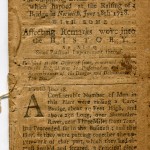 Another quite ephemeral piece is An account of the surprizing events of providence, which hapned [sic] at the raising of a bridge in Norwich, June 28th 1728 (New London, 1728).
Another quite ephemeral piece is An account of the surprizing events of providence, which hapned [sic] at the raising of a bridge in Norwich, June 28th 1728 (New London, 1728).
This is part news story and part moral contemplation. Forty men were working on building a bridge over the Shetucket River (about 3 miles from Norwich, CT), when a 100-foot section collapsed, dropping most of them 20 feet (and one man 40 feet) amid falling timbers to the rocky shallows below. Many were injured, and two died: Jonathan Gale of Canterbury (who was just 19, whose father had recently died as well), and Daniel Tracy (who was 76, and only there to see the work being done as one of the founders of the project–he just happened to be on the bridge at the time). This copy belonged to Tracy’s son, Winslow Tracy (1689-1768), which we can deduce from his signature, which he practiced writing on the back:
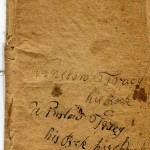 Another item, close to my bibliophilic heart, is a 1743 catalogue of the books in the Yale College Library. It’s funny to think that this little 44-page pamphlet lists some 2,600 books of a library that now holds over 12 million volumes–a mere 270 years later.
Another item, close to my bibliophilic heart, is a 1743 catalogue of the books in the Yale College Library. It’s funny to think that this little 44-page pamphlet lists some 2,600 books of a library that now holds over 12 million volumes–a mere 270 years later.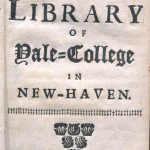 Lastly, my favorite, in an age when title-pages were like movie trailers today, giving a pithy summation of what was to come: The adventures of Colonel Daniel Boon, one of the first settlers at Kentucke: containing the wars with the Indians on the Ohio, from 1769 to 1783, and the first establishment and progress of the settlement on that river. Written by the Colonel himself. To which is added, A narrative of the captivity, and extraordinary escape of Mrs. Francis Scott, an inhabitant of Washington County, Virginia; who after the murder of her husband and children, by the Indians, was taken prisoner by them; on the 29th of June, 1785. (Norwich, 1786).
Lastly, my favorite, in an age when title-pages were like movie trailers today, giving a pithy summation of what was to come: The adventures of Colonel Daniel Boon, one of the first settlers at Kentucke: containing the wars with the Indians on the Ohio, from 1769 to 1783, and the first establishment and progress of the settlement on that river. Written by the Colonel himself. To which is added, A narrative of the captivity, and extraordinary escape of Mrs. Francis Scott, an inhabitant of Washington County, Virginia; who after the murder of her husband and children, by the Indians, was taken prisoner by them; on the 29th of June, 1785. (Norwich, 1786).